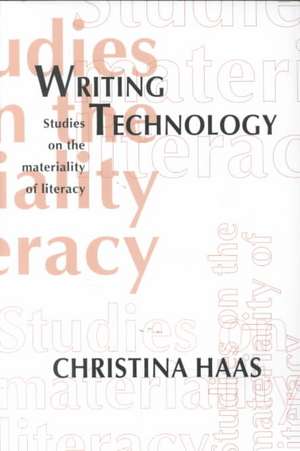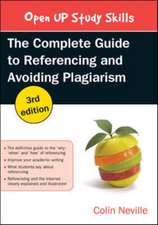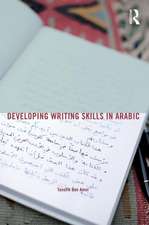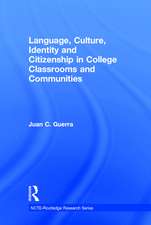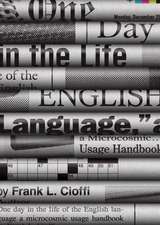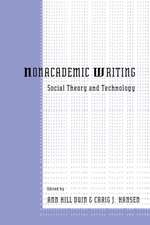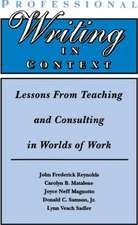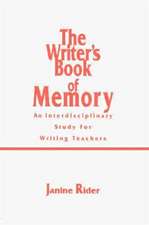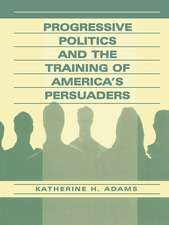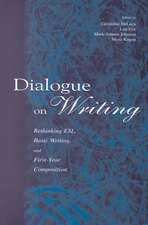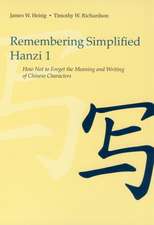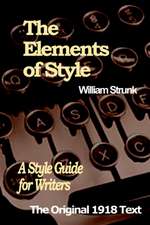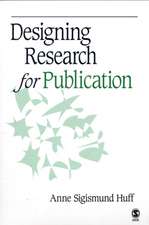Writing Technology: Studies on the Materiality of Literacy
Autor Christina Haasen Limba Engleză Paperback – noi 1995
This book is about the relationship of writing to its technologies. It uses history, theory and empirical research to argue that the effects of computer technologies on literacy are complex, always incomplete, and far from unitary -- despite a great deal of popular and even scholarly discourse about the inevitability of the computer revolution. The author argues that just as computers impact on discourse, discourse itself impacts technology and explains how technology is used in educational settings and beyond.
| Toate formatele și edițiile | Preț | Express |
|---|---|---|
| Paperback (1) | 357.81 lei 6-8 săpt. | |
| Taylor & Francis – noi 1995 | 357.81 lei 6-8 săpt. | |
| Hardback (1) | 1008.02 lei 6-8 săpt. | |
| Taylor & Francis – noi 1995 | 1008.02 lei 6-8 săpt. |
Preț: 357.81 lei
Nou
Puncte Express: 537
Preț estimativ în valută:
68.47€ • 74.35$ • 57.52£
68.47€ • 74.35$ • 57.52£
Carte tipărită la comandă
Livrare economică 23 aprilie-07 mai
Preluare comenzi: 021 569.72.76
Specificații
ISBN-13: 9780805819946
ISBN-10: 0805819940
Pagini: 304
Dimensiuni: 152 x 229 x 18 mm
Greutate: 0.49 kg
Ediția:1
Editura: Taylor & Francis
Colecția Routledge
Locul publicării:Oxford, United Kingdom
ISBN-10: 0805819940
Pagini: 304
Dimensiuni: 152 x 229 x 18 mm
Greutate: 0.49 kg
Ediția:1
Editura: Taylor & Francis
Colecția Routledge
Locul publicării:Oxford, United Kingdom
Public țintă
ProfessionalCuprins
Contents: Preface. Part I: Writing in the Material World. The Technology Question. Technology Studies. Part II: The Role of Technology in the Cognition of Literacy. Reading On-Line. Materiality and Thinking: The Effects of Computer Technology on Writers' Planning. Text Sense and Writers' Materially Based Representations of Text. Part III: The Social and Cultural Construction of Literacy Tools. Social Dynamics, or Scientific Truth, or Sheer Human Cussedness: Design Decisions in the Evolution of a User Interface. Constructing Technology Through Discourse with Ann George. Part IV: Conclusions and Future Inquiry. Historicizing Technology. Theorizing Technology.
Recenzii
"The author suggests that writing and technology constitute one another in a symbiotic relation, and the book is a powerful attempt to analyse this complex relationship."
—The National Literacy Trust's Guide to books on literacy published during 1995
An adequate theory of literacy, to be useful to all interested professionals, must itself be flexible enough to encompass the dynamic relationship between technology and literacy: multidirectional, multilayered, and composed of ever-changing agendas.
—Technical Communication, First Quarter 1997
"...Haas give us a clear view of how we might develop a more complicated approach to technology. Haas' book is replete with methods, scenarios, and examples of what it means for a discipline to think through technology."
—IEEE
"This is an absorbing book which addresses an issue of interest to a wide range of disciplines....This book will interest everybody concerned with understanding and theorizing the process of historical and cultural change in literate behaviours and offers researchers a sound model of research in the area of developing literacy competence."
—School Psychology International
"Recent years have seen countless studies and articles on the effects of word processing and computer technologies on writing and learning to write. Many of these articles have focused on narrow empirical questions concerning whether or not and how word processing helps students write and learn to write. What has been missing and what this proposal promises is a broad but focused cultural analysis of computer technologies. Prof. Haas' research makes salutary, ingenious use of Vygotsky's conceptual apparatus concerning thought and language to enlighten current deliberations of computer technologies and their effects on literacy development. Her project will be important to discourse theorists, educational researchers, and teachers of writing."
—Martin Nystrand
University of Wisconsin-Madison
"A stimulating exploration of the problems and possibilities for writing raised by new computer technologies....Writing Technology is an important study of the complex and changing relations among literacy, technology, and culturally situated cognition."
—Lester Faigley
The University of Texas at Austin
"...an excellent contribution to the studies of computers and to the field of technology studies in general....Starting with the 'technology question,' the book presents a well-supported argument whose implications extend well beyond simple accounts of writing tools. It should be read by anyone interested in writing, literacy, or technology studies."
—Chip Bruce
University of Illinois
—The National Literacy Trust's Guide to books on literacy published during 1995
An adequate theory of literacy, to be useful to all interested professionals, must itself be flexible enough to encompass the dynamic relationship between technology and literacy: multidirectional, multilayered, and composed of ever-changing agendas.
—Technical Communication, First Quarter 1997
"...Haas give us a clear view of how we might develop a more complicated approach to technology. Haas' book is replete with methods, scenarios, and examples of what it means for a discipline to think through technology."
—IEEE
"This is an absorbing book which addresses an issue of interest to a wide range of disciplines....This book will interest everybody concerned with understanding and theorizing the process of historical and cultural change in literate behaviours and offers researchers a sound model of research in the area of developing literacy competence."
—School Psychology International
"Recent years have seen countless studies and articles on the effects of word processing and computer technologies on writing and learning to write. Many of these articles have focused on narrow empirical questions concerning whether or not and how word processing helps students write and learn to write. What has been missing and what this proposal promises is a broad but focused cultural analysis of computer technologies. Prof. Haas' research makes salutary, ingenious use of Vygotsky's conceptual apparatus concerning thought and language to enlighten current deliberations of computer technologies and their effects on literacy development. Her project will be important to discourse theorists, educational researchers, and teachers of writing."
—Martin Nystrand
University of Wisconsin-Madison
"A stimulating exploration of the problems and possibilities for writing raised by new computer technologies....Writing Technology is an important study of the complex and changing relations among literacy, technology, and culturally situated cognition."
—Lester Faigley
The University of Texas at Austin
"...an excellent contribution to the studies of computers and to the field of technology studies in general....Starting with the 'technology question,' the book presents a well-supported argument whose implications extend well beyond simple accounts of writing tools. It should be read by anyone interested in writing, literacy, or technology studies."
—Chip Bruce
University of Illinois
Notă biografică
Cristina Haas, The Pennsylvania State University
